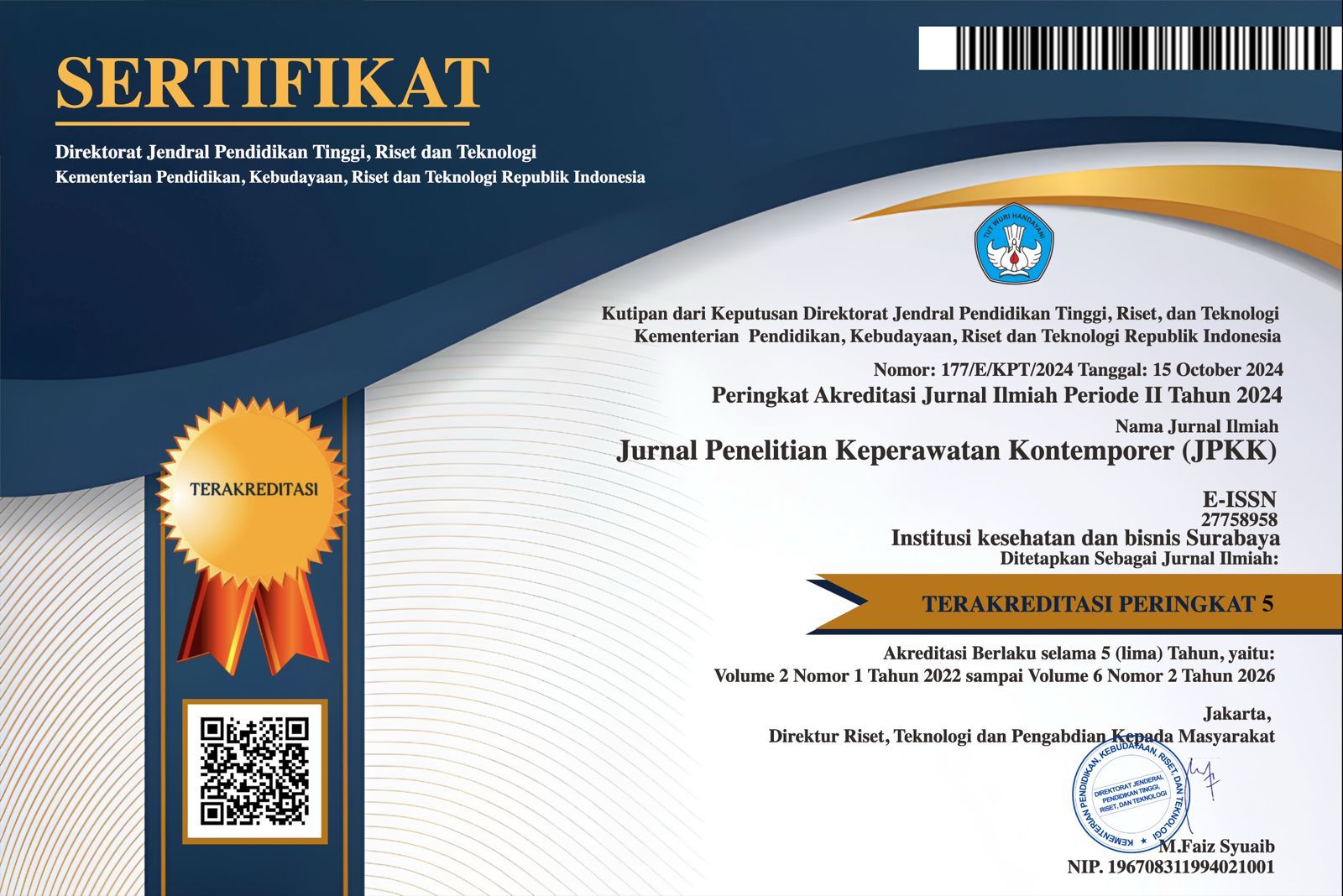THE RELATIONSHIP OF NURSES' KNOWLEDGE REGARDING EWS (EARLY WARNING SCORE) TOOLS AND THEIR APPLICATION TO PATIENTS AT SILOAM HOSPITAL MANADO
DOI:
https://doi.org/10.59894/jpkk.v2i2.1081Keywords:
early warning score, tingkat pengetahuan, pelaksana ews, siloam manado, rumah sakitAbstract
Background: Early Warning Score (EWS) is a system for requesting help to overcome patient health problems early which is based on an assessment of changes in the patient's condition through systematic observation of all changes in the patient's physiology. Inconsistent implementation of EWS can be caused by decreased awareness of the importance of monitoring vital signs and the level of knowledge of nurses. Objective: To determine the relationship between nurses' knowledge regarding EWS tools and their application to patients at Siloam Manado Hospital. Method: This research is a correlational descriptive quantitative research with a cross sectional approach with a sample of 50 people. The sampling technique used purposive sampling, namely 50 people. Results: Based on the results of the chi square test, 40 respondents (95.2%) had high knowledge of the correct application of EWS, 6 respondents (75.0%) had low knowledge. The results of the bivariate test using the chi square test showed that the level of nurses' knowledge did not have a significant relationship with the implementation of EWS with a value of (p=0.000) supported by a contingency coefficient of 0.000. Future research should examine performance behavior by observing the population to see a more complete implementation of EWS.
Keywords: Early warning score; Level of knowledge; implementation of EWS.
References
Agri Cristia Ratag (2019). Hubungan Tingkat Pengetahuan Dan Motivasi Perawat Dalam Pelaksanaan Early Warning Score (EWS) Ruang Rawat Inap Di Satu Rumah Sakit Swasta Indonesia Bagian Tengah. Manado: Universitas Pelita Harapan.
Aziz Alimul Hidayat (2021). Menyusun Instrumen Penelitian & Uji Validitas Reliabilitas. Surabaya: Health Books Publishing. Retrieved From: https://www.google.co.id/books/
edition/Menyusun_Instrumen_Penelitian_Uji_Validi/0dAeEAAAQBAJ?hl=id&gbpv
=1&dq=instrumen+penelitian&printsec=frontcover
Chengyin et al. 2019. A Real-Time Early Warning System for Monitoring Inpatient Mortality Risk: Prospective Study Using Electronic Medical Record Data. Journal of Medical Internet Research.
Cooper, D. R., & Schindler, P. S. (2014). Business Research Methods (12 ed). Newyork: McGraw-Hill/Irwin.
Dame, Kumaat dan Laihad. 2018. Gambaran Tingkat Pengetahuan Perawat Tentang Code Blue System di RSUP Prof. Dr. R. D. Kandou Manado. Jurnal e-Clinic (eCl), Volume 6, Nomor 2, Juli-Desember 2018.
Elysabeth, D. (2017). National Early Warning Score System NEWSS. Nursing symposium Neurology Updates.
I Made Sudarma (2021). Metodologi Penelitian Kesehatan. Medan : Yayasan kita menulis.
Retrieved From : https://www.google.co.id/books/edition/Metodologi_Penelitian
_Kesehatan/DDYtEAAAQBAJ?hl=id&gbpv=1&dq=kerangka+konseptual+penelitian
&printsec=frontcover
Mannulang Risca. Hubungan Karakteristik Perawat Dengan Pengetahuan dalam Penilaian Early Warning Score (EWS) di Ruang Perawatan Rumah Sakit Santa Elisabeth . 2020
Notoatmodjo, Soekodjo. (2019). Promosi Kesehatan dan Perilaku Kesehatan. Jakarta: Rineka Cipta.
Notoatmodjo, S. 2014. Promosi Kesehatan dan Perilaku Kesehatan. Jakarta: Rineka Cipta.
Subhan Giwangkencana, Prihartono, Doddy Tavianto. 2019. Implementasi Early Warning Score pada Kejadian Henti Jantung di Ruang Perawatan RSUP Dr. Hasan Sadikin Bandung yang Ditangani Tim Code Blue Selama Tahun 2017. Jurnal Anestesi Perioperatif.
Tery Luky Puspitawati (2022). Penerapan Early Warning Score dalam Menurunkan Kegawat Daruratan Pasien di Rawat Inap. Jakarta : Siloam Training Center.
Yuni Prihadi Utomo (2020). Analisis Chi Square Untuk Penelitian Sosial dan Medik. Yogyakarta: Pandiva Buku. Retrieved From : https://www.google.co.id/books/edition
/Analisis_Chi_Square_untuk_Penelitian_Sos/2_zrDwAAQBAJ?hl=id&gbpv=1&dq=
rumus+statistik+chi+square&pg=PA13&printsec=frontcover
Downloads
Published
How to Cite
Issue
Section
License
Copyright (c) 2025 Hesky Frengky Ngongoloy NGONGOLOY

This work is licensed under a Creative Commons Attribution 4.0 International License.
All articles published by Jurnal Penelitian Keperawatan Kontemporer (JPKK), the authors hold the copyright under license Creative Commons Attribution License.











